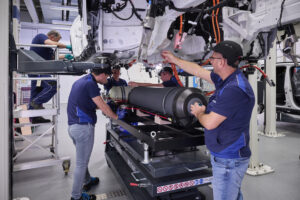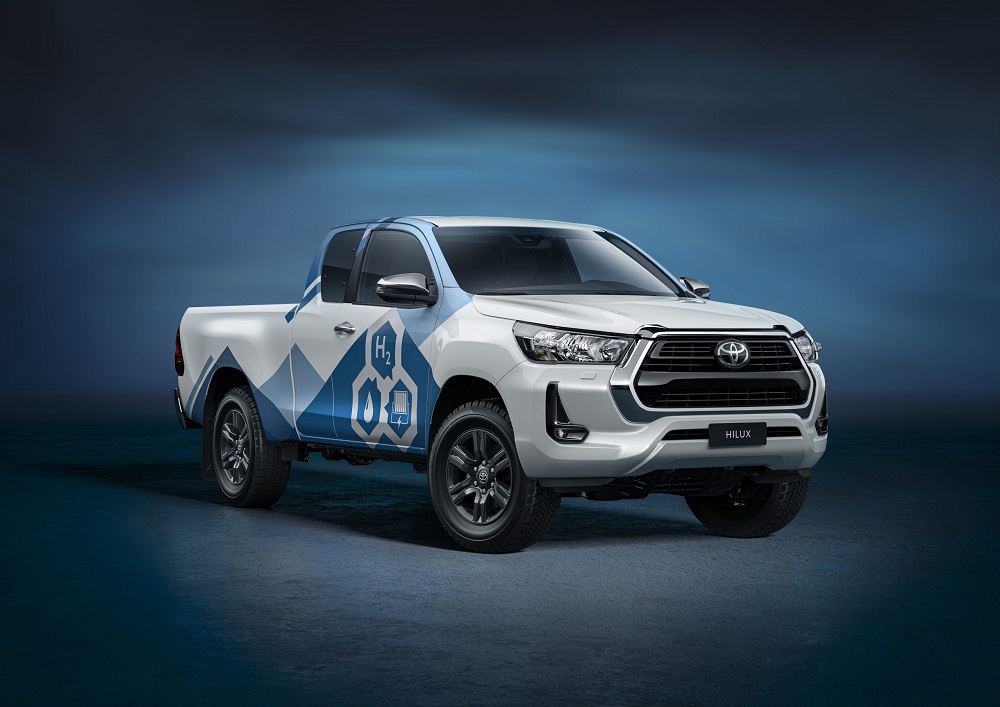
BMW & Toyota developing hydrogen-powered vehicles
By onTechnology
The BMW Group has begun production of its iX5 Hydrogen model, which is the first-ever Sports Activity Vehicle (SAV) with hydrogen fuel cell technology, while Toyota is working to develop a hydrogen-powered prototype of its Hilux pickup truck.
BMW says “an intensive programme of testing under demanding conditions” has already been completed during development and will now be used as a technology demonstrator for locally carbon-free mobility in selected regions beginning in spring 2023.
“Hydrogen is a versatile energy source that has a key role to play as we progress towards climate neutrality,” said Frank Weber, BMW AG Board of Management member. “We are certain that hydrogen is set to gain significantly in importance for individual mobility and therefore consider a mixture of battery and fuel cell electric drive systems to be a sensible approach in the long term. Fuel cells don’t require any critical raw materials such as cobalt, lithium or nickel either, so by investing in this type of drive system we are also strengthening the geopolitical resilience of the BMW Group. Our BMW iX5 Hydrogen test fleet will allow us to gain new and valuable insights, enabling us to present customers with an attractive product range once the hydrogen economy becomes a widespread reality.”
The BMW iX5 Hydrogen is being built in the OEM’s pilot plant at its Research and Innovation Centre in Munich.
“Production of the BMW iX5 Hydrogen and the BMW-developed fuel cell systems demonstrates our supreme flexibility and unrivalled know-how in the field of small-scale manufacture,” said Milan Nedeljković, BMW AG Board of Management member. “It shows we already boast the necessary expertise for integrating hydrogen technology into the BMW iFACTORY production system as an additional type of drive.”
BMW’s Plant Spartanburg in South Carolina supplies the base vehicles for the hydrogen model, which has been developed on the platform of the BMW X5. They are fitted with a new floor assembly in the pilot plant’s body shop making it possible to accommodate two hydrogen tanks in the center tunnel and under the rear seat unit. The model-specific 12V and 400V electrical systems, high-performance battery, electric motor, and fuel cell are all integrated during the assembly stage alongside standard production parts.
Positioned in the rear axle area along with the high-performance battery, the electric motor is a product of the current, fifth-generation BMW eDrive technology also employed in battery electric and plug-in hybrid models from BMW. The fuel cell systems located under the hood of the BMW iX5 Hydrogen have been manufactured at BMW’s in-house competence center for hydrogen in Garching to the north of Munich since August.
Numerous components are produced exclusively for the hydrogen-powered SAV, including some made at the Additive Manufacturing Campus – the BMW Group’s competence center for 3D printing – which also forms part of the pilot plant.
Thatcham Research, Toyota Motor Manufacturing (UK), and a consortium of specialist industry partners are also working together to develop a hydrogen version of Toyota’s iconic Hilux pickup. The consortium plans to adopt Toyota Mirai fuel cell components to transform the pickup into a hydrogen fuel cell vehicle. The multi-year project will result in the production of initial vehicle prototypes throughout 2023 at TMUK’s Burnaston site in the UK.
To prepare the Hilux for the UK market, Thatcham Research insurance risk intelligence and engineering expertise will be required to assess the repair and safety implications of any adaptations made to the standard Hilux throughout the design process, a joint news release states. “This includes making recommendations for vehicle development to ensure strong passive and active safety performance, while providing early awareness of potential repair challenges.”
Thatcham Research Chief Revenue Officer Miller Crockart said “continued research and the development of alternative fuel types, such as hydrogen, also hold the potential to play a key part in achieving UK carbon neutrality goals,” in addition to decarbonization opportunities provided by electric vehicles (EVs).
“This project is a good example of how Government and the automotive sector can bring innovation and new growth opportunities to the UK motor industry. At Thatcham Research, we are supporting more and more OEMs on their complex journey along the Road to Zero, with design advice, training, and testing on insurance-critical aspects such as repair, maintenance, safety, and sustainability. A collaborative relationship between OEMs and the Insurance sector is to everyone’s benefit, and this is a great model for that working in practice.”
More than 30 countries have released hydrogen roadmaps and the industry has announced more than 200 hydrogen projects and ambitious investment plans, according to the news release.
“This is a hugely significant project for Toyota and the consortium,” said Richard Kenworthy, Toyota Motor Manufacturing (UK) managing director. “It is great to work alongside well-established companies such as Thatcham Research and acknowledge what they can bring to this project. Their experience and knowledge of the repair and safety aspects of the vehicle development will enable the wider automotive sector to upskill and be hydrogen ready. This will then also have a direct impact on the insurance rating of the final vehicle. We are confident that this is a winning combination of companies that can collectively contribute to the hydrogen landscape, supporting new job skills and competencies going forward.”
Images
Featured image: Production of the BMW iX5 Hydrogen is shown. (Credit: BMW)
Toyota is working with Thatcham Research and others in the UK to develop a hydrogen fuel cell prototype of its Hilux pickup truck. (Credit: Toyota/Thatcham Research)
More information
New Honda fuel cell EV will likely have similar repair procedures to Clarity

